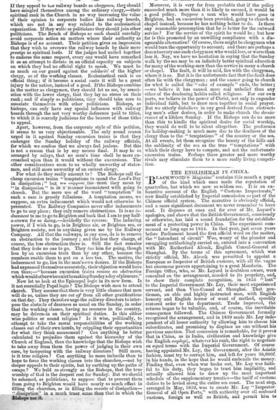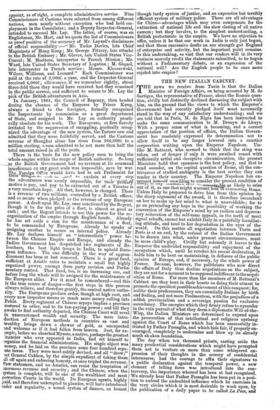THE ENGLISHMAN IN 1:11E1NA.. "B -1.-A-C.YeilrOOi5E 'Magazine" contains this month a
paper of the kind which once made the reputation of quarterlies, but which we now so seldom see. It is an ex- haustive account of the English "Customs Inspectorate," now finally established by Imperial commission as part of the Chinese official system. The narrative is obviously official, and a more significant document we never remember to have read. It disposes at once and for ever of Mr. Layard's apologies, and shows that the British Government, consciously or otherwise, has laid a sound foundation for the establish- ment of a protecting power in China. The experiment com- menced so long ago as 1854. In that year, just seven years before Parliament heard the first official word on the matter, the "Intendant of circuit" Woo, weary of the plunder and smuggling unblushingly carried on, entered into a convention with Mr. Rutherford Alcock, English Consul-General at Shanghai. By the terms of this agreement, which was strictly official, Mr. Alcock was permitted to appoint a European as Inspector of British customs, with all the vague but enormous powers appertaining to a great Mandarin. The Foreign Office, who, as Mr. Layard is doubtless aware, were consulted on the arrangement, acceded to its propriety, and, to show their complete recognition, in 1855 "lent" to the Imperial Government Mr. Lay, their most experienced servant, and then Vice-Consul at Shanghai. That gen- tleman, an able and highly instructed man, with English honesty and English horror of want of method, speedily restored order to the department. Trade improved, the returns began to be valuable, and, of course, the inevitable consequence followed. The Chinese Government formally recognized the arrangement, and in 1859 made Mr. Lay inde- pendent of all lesser authority by allowing him to choose his subordinates, and promising to displace no one without his previous sanction. That concession is remarkable, for it proves that in China, as in India, civilization and knowledge give the English employe„ whatever his rank, the right to negotiate on equal terms with the Imperial Government. Of course having appointed Mr. Lay, the Government, after the Asiatic, fashion, must try to corrupt him, and left for years 30,000/. in his hands, in the hope that he would embezzle the money. Finding that, even when war broke out, Mr. Lay was faith- ful to his duty, they began to trust him implicitly, and actually allowed him to draw up the most important schedule of the supplementary treaties—the tariff of customs duties to be levied along the entire sea coast. The next step, arranged in May, 1859, was to create Mr. Lay "Inspector- General of all Open Ports," with authority over all seaboard customs, foreign as well as British, and permit him to paid at the rate of 2,000/. a year, and the Inspector-General received 4,000/., allowances, if we remember rightly, about THE NEW ITALIAN CABINET. three-fold those they would have received had they remained rilHE news we receive from Turin is that the Italian in the public service, and sufficient to secure to Mr. Lay the J_ Minister of Foreign Affairs, on being accosted by M. de pick of the British adventurers in Asia. Sartiges, the representative of France, about the Roman ques- In January, 1861, the Council of Regency, then headed tion, civilly but distinctly declined discussing the subject with during the absence of the Emperor by Prince Kung, him, on the ground that the views to which the Emperor's always a friend to the foreigner, formally recognized Government had recently pledged itself must necessarily the Inspectorate by commission as a great department stand in the way of any satisfactory understanding; and we- of State, and assigned to Mr. Lay an authority practi- are told that in Paris, 'M. de Nina has been instructed to cally absolute for his work. The Europeans, at first fiercely make the same communication °to M. Drouyn de Lhuys. irritated by the suppression of smuggling gradually recog- With a proper sense of what is becoming, and a correct nized the advantage of the new system, the Tartars saw and appreciation of the position of affairs, the Italian Govern- admitted that they were faithfully served, and the Customs ment has resolutely expressed its determination not to revenue of Shanghai alone has risen from 266,0001. to a allow itself to be any longer lowered into a courtier million sterling, a sum admitted to be not more than half the corporation waiting upon the Emperor Napoleon. Un- total amount raised in all the ports. like M. Rattazzi, who seemed to think that the sting was There is the basis for the new policy soon to bring the taken out of danger if only it were swathed round with whole empire within the range of British authority. So long sufficiently artful and deceptive circumlocution, the present the British Government had no revenue at its command Ministers hold that openness is the best policy, and that to inter ei-1-7"-----Cen en- anyEcat scale was impossible, save by war. rend asunder, on the capital question of Rome, all the con- The F reign Office would have had to ask Parliament for trivances of Audied ambiguity is the best service they can the adventurers was nearly impossible, for their-pig BiaPir 2.y,- curj motive is pay, and pay to be extracted out of a Taoutae is out of it, as one that might warrant him as Rome.





























































 Previous page
Previous page